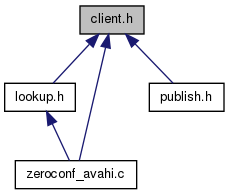#include <inttypes.h>#include <avahi-common/cdecl.h>#include <avahi-common/address.h>#include <avahi-common/strlst.h>#include <avahi-common/defs.h>#include <avahi-common/watch.h>#include <avahi-common/gccmacro.h>

Go to the source code of this file.
Detailed Description
Definitions and functions for the client API over D-Bus
Definition in file client.h.
Typedef Documentation
| typedef typedefAVAHI_C_DECL_BEGIN struct AvahiClient AvahiClient |
| typedef void(* AvahiClientCallback)(AvahiClient *s, AvahiClientState state, void *userdata) |
Enumeration Type Documentation
| enum AvahiClientFlags |
- Enumerator:
AVAHI_CLIENT_IGNORE_USER_CONFIG Don't read user configuration
AVAHI_CLIENT_NO_FAIL Don't fail if the daemon is not available when avahi_client_new() is called, instead enter AVAHI_CLIENT_CONNECTING state and wait for the daemon to appear
| enum AvahiClientState |
States of a client object, a superset of AvahiServerState
- Enumerator:
AVAHI_CLIENT_S_REGISTERING Server state: REGISTERING
AVAHI_CLIENT_S_RUNNING Server state: RUNNING
AVAHI_CLIENT_S_COLLISION Server state: COLLISION
AVAHI_CLIENT_FAILURE Some kind of error happened on the client side
AVAHI_CLIENT_CONNECTING We're still connecting. This state is only entered when AVAHI_CLIENT_NO_FAIL has been passed to avahi_client_new() and the daemon is not yet available.
Function Documentation
| int avahi_client_errno | ( | AvahiClient * | ) |
Get the last error number. See avahi_strerror() for converting this error code into a human readable string.
| void avahi_client_free | ( | AvahiClient * | client | ) |
Free a client instance. This will automatically free all associated browser, resolve and entry group objects. All pointers to such objects become invalid!
| const char* avahi_client_get_domain_name | ( | AvahiClient * | ) |
Get domain name
| const char* avahi_client_get_host_name | ( | AvahiClient * | ) |
Get host name
| const char* avahi_client_get_host_name_fqdn | ( | AvahiClient * | ) |
Get FQDN domain name
| AvahiClientState avahi_client_get_state | ( | AvahiClient * | client | ) |
Get state
| const char* avahi_client_get_version_string | ( | AvahiClient * | ) |
Get the version of the server
| AvahiClient* avahi_client_new | ( | const AvahiPoll * | poll_api, |
| AvahiClientFlags | flags, | ||
| AvahiClientCallback | callback, | ||
| void * | userdata, | ||
| int * | error | ||
| ) |
Creates a new client instance
- Parameters:
-
poll_api The abstract event loop API to use flags Some flags to modify the behaviour of the client library callback A callback that is called whenever the state of the client changes. This may be NULL. Please note that this function is called for the first time from within the avahi_client_new() context! Thus, in the callback you should not make use of global variables that are initialized only after your call to avahi_client_new(). A common mistake is to store the AvahiClient pointer returned by avahi_client_new() in a global variable and assume that this global variable already contains the valid pointer when the callback is called for the first time. A work-around for this is to always use the AvahiClient pointer passed to the callback function instead of the global pointer. userdata Some arbitrary user data pointer that will be passed to the callback function error If creation of the client fails, this integer will contain the error cause. May be NULL if you aren't interested in the reason why avahi_client_new() failed.
| int avahi_client_set_host_name | ( | AvahiClient * | , |
| const char * | name | ||
| ) |
Set host name.
- Since:
- 0.6.13
| int avahi_nss_support | ( | void | ) |
Return 1 if gethostbyname() supports mDNS lookups, 0 otherwise.
- Since:
- 0.6.5